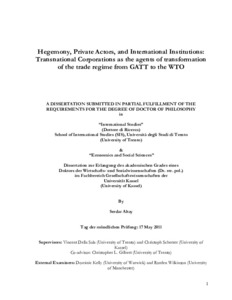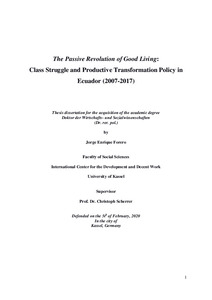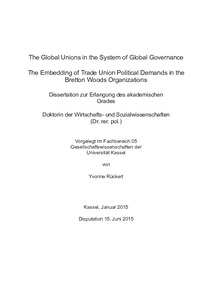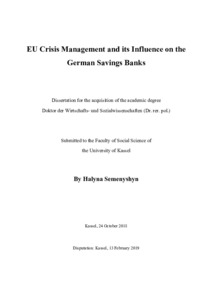Suche
Anzeige der Dokumente 1-4 von 4
Dissertation
 Hegemony, Private Actors, and International Institutions: Transnational Corporations as the agents of transformation of the trade regime from GATT to the WTO
Hegemony, Private Actors, and International Institutions: Transnational Corporations as the agents of transformation of the trade regime from GATT to the WTO
(2012-08-13)
Diese Dissertation hat das Ziel, zum einen die Transformation des Handelssystems von der GATT zur Welthandelsorganisation (WTO) im Kontext einer veränderten Weltordnung und zum anderen die Rollen von transnationalen Unternehmen im Rahmen dieser Transformation zu untersuchen und zu verstehen. Die Arbeit wird theoretisch vom Neogramscianismus angeleitet, da die etablierten Ansätzen in den Internationalen Beziehungen und der International Politischen Ökonomie nur unzureichend die intersubjektive Natur von Regimen und ...
Dissertation

 The Passive Revolution of Good Living
The Passive Revolution of Good Living
(2020)
The PhD thesis "The Passive Revolution of Good Living: Class Struggle and Productive Transformation Policy in Ecuador (2007-2017)" suggests an interpretation of Ecuador's so-called ‘Citizens’ Revolution’ – CR – as the political project of a 'cadre fraction’: a ‘state class fraction’ whose legitimacy and political power is grounded in specialized knowledge and planning capabilities. Breaking the “catastrophic equilibrium” in which the anti-neoliberal forces and the dominant classes ended up at the beginning of the ...
Dissertation
 The Global Unions in the System of Global Governance
The Global Unions in the System of Global Governance
(2015)
Im Jahr 2002 etablierten die internationalen Gewerkschaftsorganisationen (Global Unions) und die internationalen Finanzinstitutionen (IFIs) einen formalen Dialog. Die Global Unions setzen sich aus dem Internationalen Gewerkschaftsbund (IGB), den neun Globalen Gewerkschaftsföderationen (GUFs) und dem Gewerkschaftlichen Beratungsausschuss bei der OECD (TUAC) zusammen. Die internationalen Finanzinstitutionen, welche aufgrund ihrer Gründungsgeschichte auch als BrettonWoods Organisationen bezeichnet werden, umfassen die ...
Dissertation
 EU Crisis Management and its Influence on the German Savings Banks
EU Crisis Management and its Influence on the German Savings Banks
(2018)
European financial architecture has been rapidly changing since the outburst of the global financial crisis in 2008. On one hand, it sparked academic discussions about the European Union (EU) integration and the future of the EU project, on the other hand, it urged the EU member states and policymakers to deal with the consequences of the crisis. The eurozone crisis has also left its imprint on the European regulatory landscape. Since 2012, the European Commission (EC) has resumed its single financial market agenda ...




